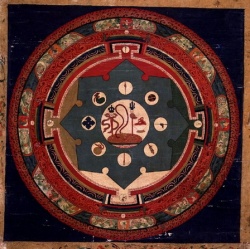The Kinnaras
There were four kinnara kings: the Kinnara King Dharma, the Kinnara King Fine Dharma, the Kinnara King Great Dharma, and the Kinnara King Upholder of Dharma, each with his retinue of several hundreds of thousands of followers.
the Kinnaras
There were four kinnara kings. Not only were there dragons present in the assembly, but there were also kinnara kings. Kinnaras are one of the Eight Classes of Supernatural Beings. The Eight Classes of Supernatural Beings include the gods, dragons, yakshas, gandharvas, asuras, garudas, and mahoragas. “Kinnara” means “doubtful spirit”, because they resemble human beings, but they have a horn on their head.
Kinnaras are musicians in the court of the Jade Emperor (Shakra).
The Kinnara King Dharma. There was a doubtful spirit called Dharma who has many dharmas or methods of making music.
The Kinnara King Fine Dharma not only has many dharmas for making music, but they are extremely fine. His music is such that it impresses all who hear it.
The Kinnara King Great Dharma and the Kinnara King Upholder of Dharma. The Kinnara King Great Dharma makes music of magnificent sounds. His Dharma is great, and so are the sounds of his music. The music made by the doubtful spirit Upholder of Dharma leads people to bring forth hearts which delight in cultivating according to Dharma.
Fine Dharma’s music not only leads people to study and practice the Buddhadharma, but it also expresses the fine and subtle sounds of Dharma. The music made by Great Dharma expresses the greatness and expansiveness of the Buddhadharma. Upholder of Dharma’s music is not only delightful to hear, it also makes people want to cultivate according to the Dharma, to receive and uphold the Dharma.
Each with his retinue of several hundreds of thousands of followers. Each kinnara king was accompanied by a lot of followers, several hundreds, or several thousands, or perhaps several tens of thousands of them in their train.
